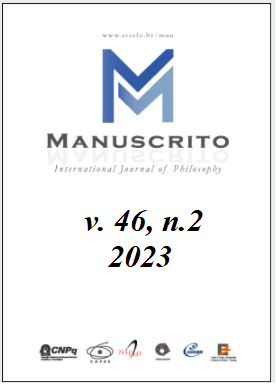Resumo
A quase-verdade (também conhecida como verdade pragmática ou verdade parcial) é normalmente apresentada como uma estrutura que leva em conta a incompletude e a incerteza nas práticas reais da ciência. Além disso, diz-se que ela é útil para acomodar casos de inconsistência na ciência sem levar à trivialidade. Neste artigo, argumentamos que o formalismo disponível não cumpre tudo o que promete. Examinamos a descrição padrão da quase-verdade na literatura, apresentada por da Costa e colaboradores em muitos lugares, e argumentamos que ela não pode legitimamente explicar a incompletude na ciência. Afirmaremos que ela confunde paraconsistência e paracompletude. Ele também não pode explicar adequadamente as inconsistências, porque nenhuma contradição direta da forma S ∧ ¬S pode ser quase-verdadeira de acordo com a estrutura; as contradições simplesmente não têm lugar no formalismo. Por fim, apresentamos uma interpretação alternativa do formalismo em termos de lidar com contextos distintos em que informações incompatíveis são tratadas. Isso não salva o programa original, mas parece dar mais sentido ao aparato.
Referências
ARENHART, J. R. B. (2016) “Paraconsistent Contradiction in Context”. In: Saberes, special issue, pp. 5-17, 2016.
BALZER, W., MOULINES, C. U., AND SNEED, J. D. An Architectonic for Science. Synthese Library vol.186. Dordrecht: Reidel, 1987.
BÉZIAU, J. Y. “S5 is a paraconsistent logic and so is first-order classical logic”. In: Logical Investigations, 9, pp. 301-9, 2002.
BROWN, B. “How to be Realistic About Inconsistency in Science”. In: Studies in History and Philosophy of Science, 21, pp.281-94, 1990.
BROWN, B., AND PRIEST, G. “Chunk and Permeate, a Paraconsistent Inference Strategy. Part 1: the Infinitesimal Calculus”. In: Journal of Philosophical Logic, 33(4), pp. 379-88, 2004.
BUENO. O. “Truth, Quasi-Truth and Paraconsistency”. In: Contemporary Mathematics, 39, pp. 275-93, 1999.
BUENO, O., AND DA COSTA, N. C. A. “Quasi-Truth, Paraconsistency, and the Foundations of Science”. In: Synthese, 154, pp. 383-99, 2007.
CARNIELLI, W., AND RODRIGUES, A. “An Epistemic Approach to Paraconsistency: a Logic of Evidence and Truth”. In: Synthese, 196(9), pp. 3789-13, 2019.
DA COSTA, N. C. A. O Conhecimento Científico (in Portuguese). São Paulo: Discurso Editorial, 1999.
DA COSTA, N. C. A. AND FRENCH, S. Science and Partial Truth: A Unitary Approach to Models and Scientific Reasoning. Oxford: Oxford University Press, 2003.
DA COSTA, N. C. A. AND KRAUSE, D. “The logic of complementarity”. In: J. van Benthem, G. Heinzmann, M. Rebushi and H. Visser (eds.), The Age of Alternative Logics: Assessing Philosophy of Logic and Mathematics Today, pp. 103-120. Cham: Springer, 2006.
DA COSTA, N. C. A. AND KRAUSE, D. “Physics, Inconsistency, and Quasi-truth”. In: Synthese, 191(13), pp. 3041-55, 2014.
DA COSTA, N. C. A., BUENO, O. AND FRENCH, S. In: “The logic of pragmatic truth”. In: Journal of Philosophical Logic, 27, pp. 603-20, 1998.
DUNN, J. M. “Partiality and its dual”. In: Studia Logica, 66, pp. 5-40, 2000.
FRAENKEL, A. A., BAR-HILLEL, Y., AND LEVY, A. Foundations of Set Theory. Amsterdam: North-Holland, 1984.
FRIEND, M., AND MARTÍNEZ-ORDAZ, M. DEL R. “Keeping Globally Inconsistent Theories Locally Consistent”. In: W. Carnielli, and J. Malinowski (eds.) Contradictions, from Consistency to Inconsistency, pp.53-88. Cham: Springer , 2018.
KRAUSE, D., ARENHART, J. R. B. The Logical Foundations of Scientific Theories. Languages, Structures and Models. New York: Routledge, 2017.
MEHEUS, J. (ed.) Inconsistency in Science. Dordrecht: Springer, 2002.
MIKENBERG, I., DA COSTA, N. C. A., AND CHUAQUI, R. “Pragmatic Truth and Approximation to Truth”. In: Journal of Symbolic Logic, 51, pp. 201-21, 1986.
MORRISON, M. “One phenomenon, many models: inconsistency and complementarity”. In: Studies in History and Philosophy of Science, 42, pp. 342-51, 2011.
OMORI, H., AND WANSING, H. “40 years of FDE: an introductory overview”. In: Studia Logica, 105(6), pp. 1021-49, 2017.
OMORI, H., AND ARENHART, J. R. B. “A Generalization of Ordered-Pair Semantics”. In: S. Gosh, T. Icar. (eds.) Lecture Notes in Computer Science, pp. 149-57. 1ed. Cham: Springer International Publishing, 2021.
OMORI, H., AND ARENHART, J. R. B. “Haack meets Herzberger and Priest”. In: 2022 IEEE 52nd International Symposium on MultipleValued Logic (IS-MVL), 2022, Dallas, pp. 137-44. California: IEEE, 2022.
PRIEST, G. Doubt Truth to be a Liar. Oxford: Oxford Un. Press, 2006.
PRIEST, G. An Introduction to Non-Classical Logics. From If to Is. 2nd edition. Cambridge: Cambridge Un. Press, 2008.
VERDÉE, P., AND ANDREAS, H. (eds). Logical Studies of Paraconsistent Reasoning in Science and Mathematics. Cham: Springer , 2016.
WANSING, H. “One heresy and one orthodoxy: On dialetheism, dimathematism, and the non-normativity of logic”. In: Erkenntnis, online first, 2022.
WANSING, H. “Beyond Paraconsistency. A plea for a radical breach with the Aristotelean orthodoxy in logic”. Forthcoming in: A. Rodrigues, H. Antunes, and A. Freire (eds.) Outstanding Contributions to Logic: a volume for Walter Carnielli. Cham: Springer , 2023.
ZALTA, E. N. “Frege’s Theorem and Foundations for Arithmetic”. In: Edward N. Zalta (ed.) The Stanford Encyclopedia of Philosophy (Summer 2019 Edition), URL=https://plato.stanford.edu/archives/sum2019/entries/frege-theorem/

Este trabalho está licenciado sob uma licença Creative Commons Attribution-NonCommercial 4.0 International License.
Copyright (c) 2023 Manuscrito: Revista Internacional de Filosofia


